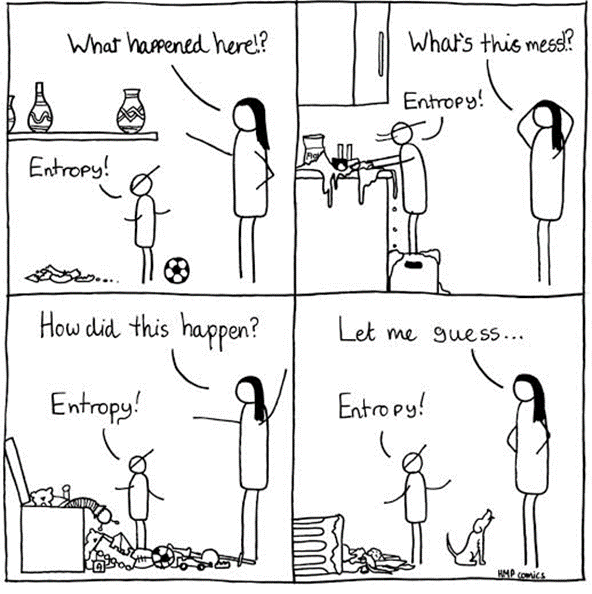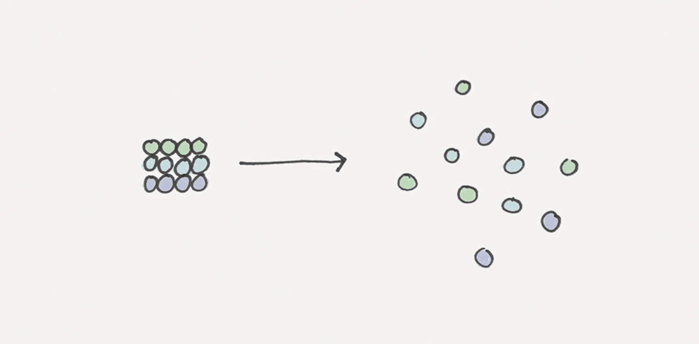Summary
In a complex world driven by disorder, Occam's Razor advocates simplicity as a powerful tool for effective problem-solving. Practical applications at GDi demonstrate that simplicity not only streamlines solutions but is a necessity, offering easier implementation, scalability, and an answer-first approach in public policy. In conclusion, simplicity stands as a crucial catalyst for impactful solutions in the face of societal entropy.
Disorder
We’ve all heard the life-only-gets-more-complicated-as-you-go-on trope growing up. As I’m about to turn 23, I already feel like I can testify to its validity. Naturally, this made me think about the causality and universality of this phenomenon. As it turns out, it’s a fundamental law of nature (so it’s not me, phew!).
It all starts with understanding entropy, one of the most misunderstood concepts in Physics. Simply put, entropy is the degree of disorder or uncertainty in a system.

The role of time
If one were to take a solved Rubik’s cube and start randomly jumbling it, it is far more likely that it will get increasingly unsolved rather than end up solved. Similarly, even though it is theoretically possible for a sand castle to remain as it is without intervention, it is far more likely to be washed away as time goes by. In fact, the likelihood of a Rubik’s cube to remain solved or a sand cast to remain intact is so low, that these events are virtually impossible. This is the basis of entropy. Without effort, things tend to move to disorder and become less organised as time passes.
“The law that entropy always increases holds, I think, the supreme position among the laws of nature.” Sir Arthur Stanley Eddington
But what is entropy’s role in society and, by extension, in public policy?
Social entropy
Johan Galtung, a Norwegian sociologist, refers to social entropy as the tendency of complex, organised and high energy social systems to naturally decay into states of low-energy, disorganised chaos.
Let us consider India. The richness of our cultural, economic and sociological diversity makes us a highly energetic and powerful nation. However, these variables significantly accelerate our journey towards disorganisation. This is evidenced by indicators of social entropy like poverty, intolerance and violence, which, despite improvements, are still highly prevalent.
Having established that society inclines towards disorder, how does one find solutions? In other words, what is our most effective tool in this constant struggle against societal entropy?
Occam’s Razor
Scholastic philosopher William of Ockham stated that “plurality should not be posited without necessity”. This principle, known as Occam’s Razor, gives precedence to simplicity. A common derivative of Occam’s Razor is: “If you have two equally likely solutions to a problem, choose the simplest”.
I contend that grasping and implementing Occam's Razor is crucial when crafting solutions for intricate social issues stemming from the rise in societal entropy.

Practical applications of simplicity in solution design
Although my tenure at GDi spans just a few months, I've developed an appreciation for simplicity in solution design and tried to incorporate the principle in my work.
In a recent collaboration between GDi and the Ministry of Women and Child Development, a critical issue surfaced. The Ministry, responsible for implementing various government initiatives focusing on the safety and empowerment of women and children, faced a common roadblock in monitoring and evaluating program efficacy. The challenge stemmed from the dependency on external stakeholders for data. Without a consistent data stream, the Ministry struggled to analyze the effectiveness of its programs and make informed policy decisions.
Upon closer examination, we identified the root cause – the complex data-sharing process. To address this, we implemented a simple yet effective solution: a streamlined and efficient bulk-upload feature, replacing the previous case-by-case data update process. This intervention led to an immediate improvement in the Ministry's data intake, enabling advanced analytics and enhanced program monitoring.
Shifting the focus to another project with the Child Adoption Resources Authority (CARA), we encountered a different set of challenges. Prospective parents were expressing grievances due to unexpected changes in the adoption waitlist. Unlike technical glitches, these changes were a result of the existing process design. Two potential solutions emerged from brainstorming sessions – a complex and time-consuming process overhaul or an emphasis on improving transparency around the existing process for prospective parents.
Adhering to the principle of Occam's Razor, we adopted the simpler solution, incorporating features to significantly enhance the information available to PAPs regarding the adoption process. While the outcomes of these features are still awaiting evaluation, the Ministry and senior leadership anticipate a notable reduction in the number of grievances received, showcasing the effectiveness of a simplified approach to problem-solving.
Conclusion
Based on my experience, the following factors contribute to the effectiveness of simpler solutions in the public policy domain:
- They are easier to implement i.e. they require less time and resources to be implemented
- They are scalable i.e. they are more suitable for expansive applications because they are easier to understand and tailor for changing requirements
- They enable an answer-first approach, prioritising iterative improvements over long-drawn solution design exercises
- They embrace constraints and force one to focus on the essence of the problem
In conclusion, simplicity is a catalyst for change. It enables us to navigate a world destined for disorder through resilient and impactful solutions. And while this is just a hypothesis, I am excited to see how this approach impacts my pursuit of contributing to GDi’s nation-building mission.
